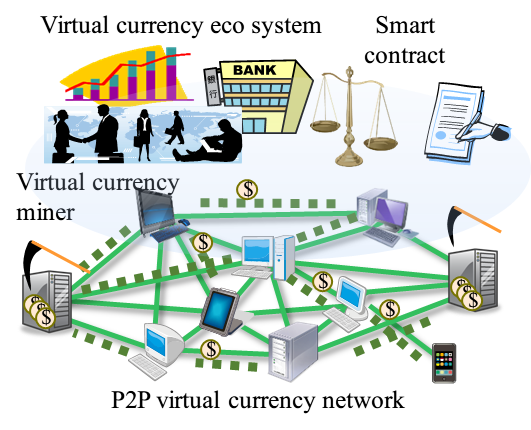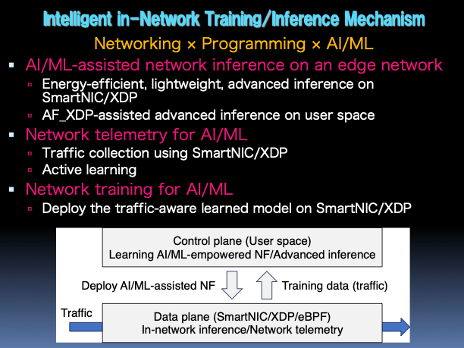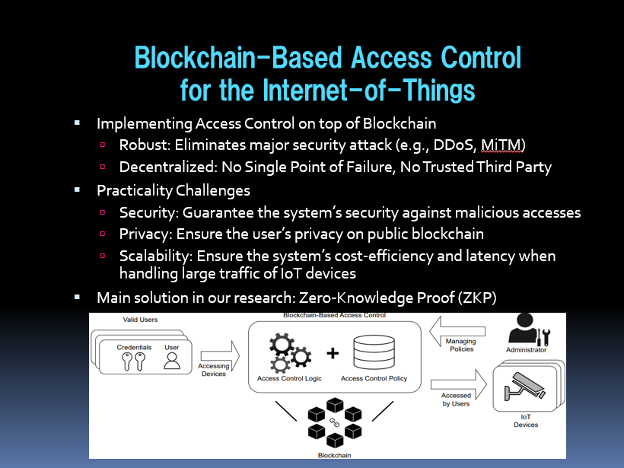Large-Scale Systems Management

Research Staff
-

Professor
Shoji KASAHARA -

Associate Professor
Takanori HARA -

Assistant Professor
Christopher WIRAATMAJA
Research Areas
System analytics and simulation
Utilizing insights from information science, such as applied probability theory, theoretical algorithms, game theory, and mechanism design, we conduct research on the design of massive data centers and network systems that highly utilize big data. Furthermore, we design services provided on these systems and study the distributed virtual currency ecosystem, represented by Bitcoin.
Ultra-scalable Blockchain technology
The foundational technology of virtual currencies, blockchain, is known to have a trilemma, unable to simultaneously satisfy the three elements of decentralization, security, and scalability. It is said to be impossible to realize a blockchain that offers high security and rapid transaction confirmation on a distributed system composed of an unspecified large number of participating nodes due to this relationship. This research theme aims to explore methodologies to overcome the blockchain trilemma through an interdisciplinary approach in information science. Specifically, it seeks to (1) mathematically elucidate the causes of the chain splitting phenomenon that leads to vulnerable security, (2) apply advanced data structures that are compressible and capable of high-speed operations to block structures and chain topology, and (3) create P2P networking technologies that enable rapid broadcast distribution of blocks. By effectively and organically integrating these technological elements, the goal is to create an extremely versatile and highly scalable blockchain technology.
Disaster Prevention Nudge Assisted Crowd Evacuation Guidance
The occurrence of large-scale natural and human disasters is inevitable, and thus the lifeline design is required under the assumption of large-scale disasters. In this research, we aim to establish crowd evacuation guidance using a disaster prevention nudge by designing disaster lifelines from the viewpoint of pedestrian flow, logistics, and information flow. In ordinary situations, we attempt to realize shelter allocation considering both logistics and accommodation with the help of game theory, mathematical optimization, and machine learning. In addition, we aim to establish the communication infrastructure with redundancy and resilience against large-scale disasters. On the other hand, in emergencies, we aim to establish a disaster prevention nudge assisted automatic evacuation guidance scheme, which allows evacuees to automatically collect and disseminate the disaster information. The disaster prevention nudge allows the crowd behavior to the social optimum under the individual selfish evacuation behavior.
In-Network Training/Inference Mechanism
Nowadays, various things are connected via networks. In this research, we interoperate artificial intelligence (AI), networking, and programming and establish architecture with fusion of communication and computation for AI by leveraging both mathematical and practical approaches. This mechanism performs AI-based computation (i.e., training, testing, and inference) on networks by making a geographically dispersed group of computation nodes cooperate with each other. From a network layer perspective, we also aim to reduce latency and data traffic and ensure data privacy in distributed machine learning (e.g., federated learning and split learning).
Algorithms for trustworthy AI
- Issues in current AI: reliability, fairness, diversity
- Vast and complex search space
- Compressed data structures such as zero-suppressed binary decision diagrams (ZDDs)
- Applications: network reliability evaluation, fair evacuation planning and political redistricting, enumerating diverse solutions
Blockchain-Based Access Control for the Internet of Things
The rapid proliferation of Internet-of-Things (IoT) devices has transformed industries such as healthcare, transportation, and smart homes, enabling seamless interconnectivity and automation. These devices empower users by offering advanced control and functionality through real-time data exchange and communication. However, their widespread deployment introduces significant security and privacy risks, making them prime targets for unauthorized access, data breaches, and cyberattacks. Designing a robust access control mechanism that effectively mitigates these threats is therefore critical.
Our research leverages blockchain's unique decentralized nature in combination with advanced cryptographic primitives to develop a robust access control, protecting user securities and privacies while being scalable. Our work exploits state-of-the-art Succinct Non-Interactive Argument of Knowledge (SNARK) technique, including set-membership proof, lookup argument, and zkSNARK, to enhance the practicality of Blockchain-Based Access Control (BBAC). We focuses on improving the cost-efficiency, latency, and computation efficiency of such BBAC while proving its security and privacy in a rigorous and formal manner.
Key Features
The Large-Scale Systems Management Lab research aims to develop mathematical modeling and simulation techniques for design, control and architecture of large-scale systems such as computer/communication networks, with which the resulting systems achieve high performance, low vulnerability and highly efficiency energy. Our research focus is on network-science oriented design frameworks, fundamental technologies and highly qualified services, particularly for large-scale computer/communication network systems. The laboratory was established in June 2012, and we welcome students from abroad who have strong interest in theories and simulation skills for designing smart services over large-scale complex systems including Blockchains, data centers, cognitive radio networks, and energy-harvesting networks.




